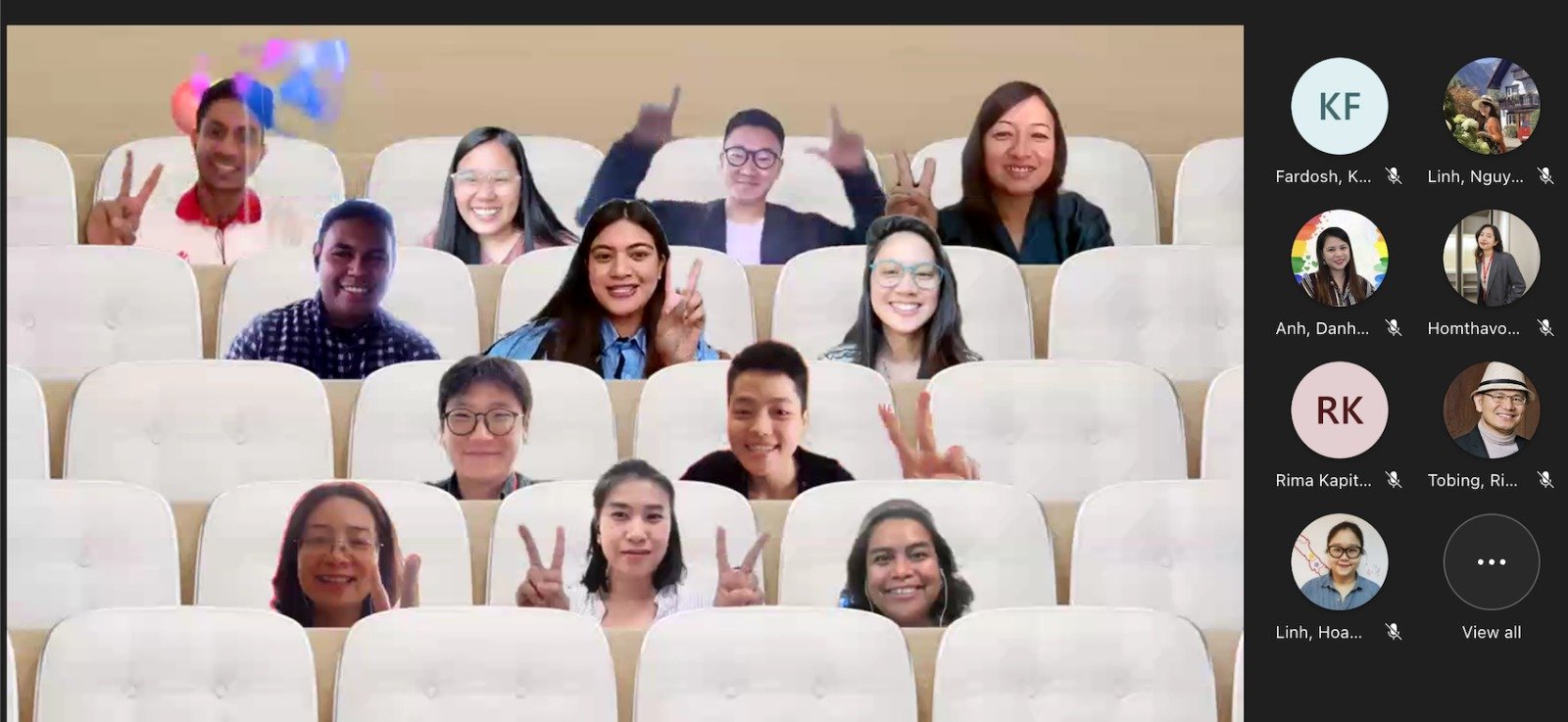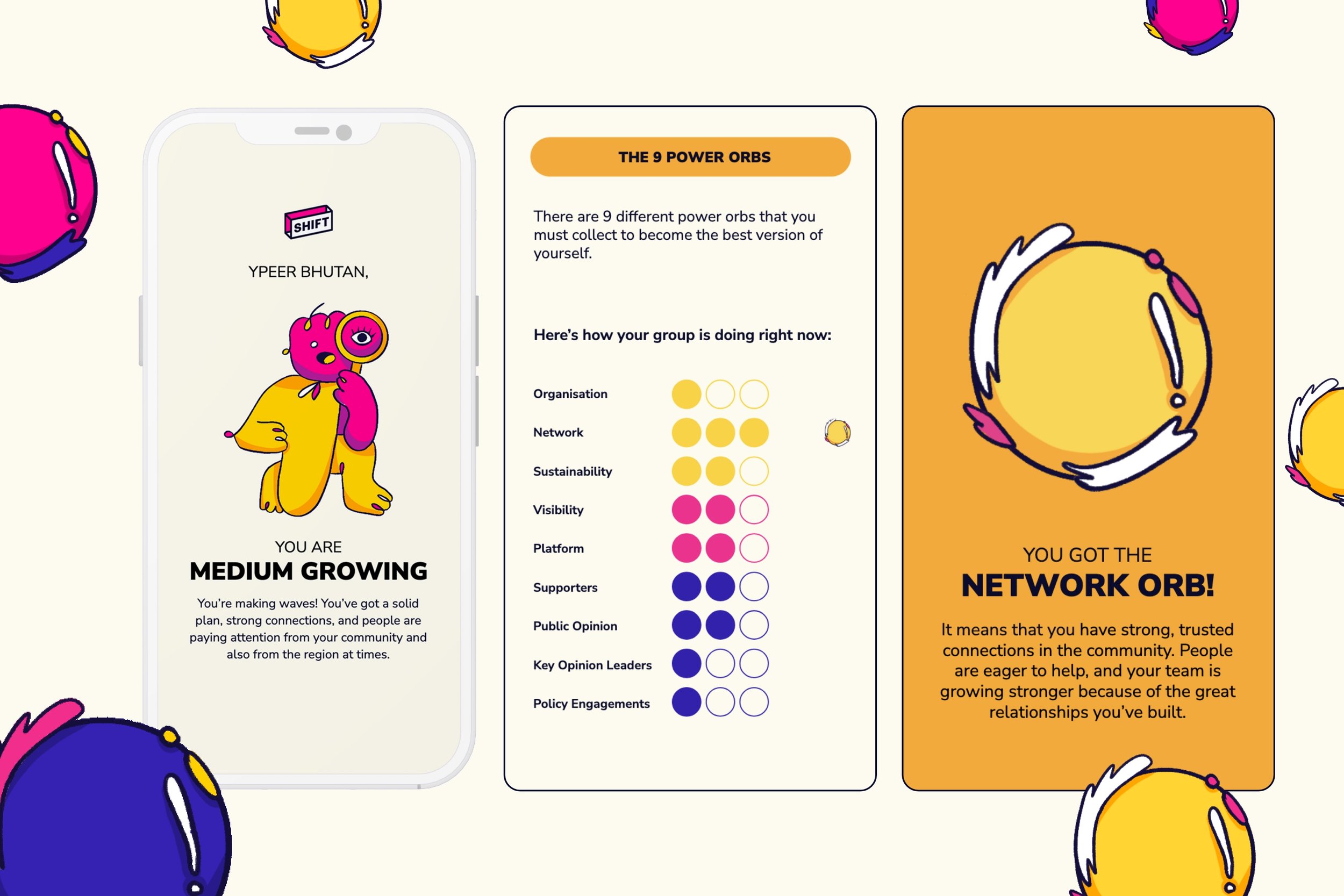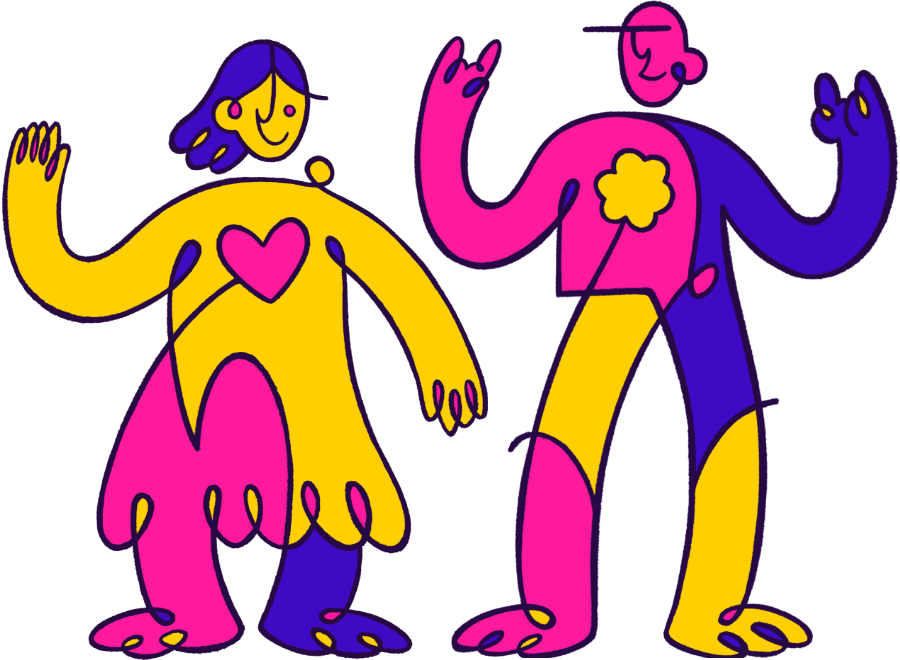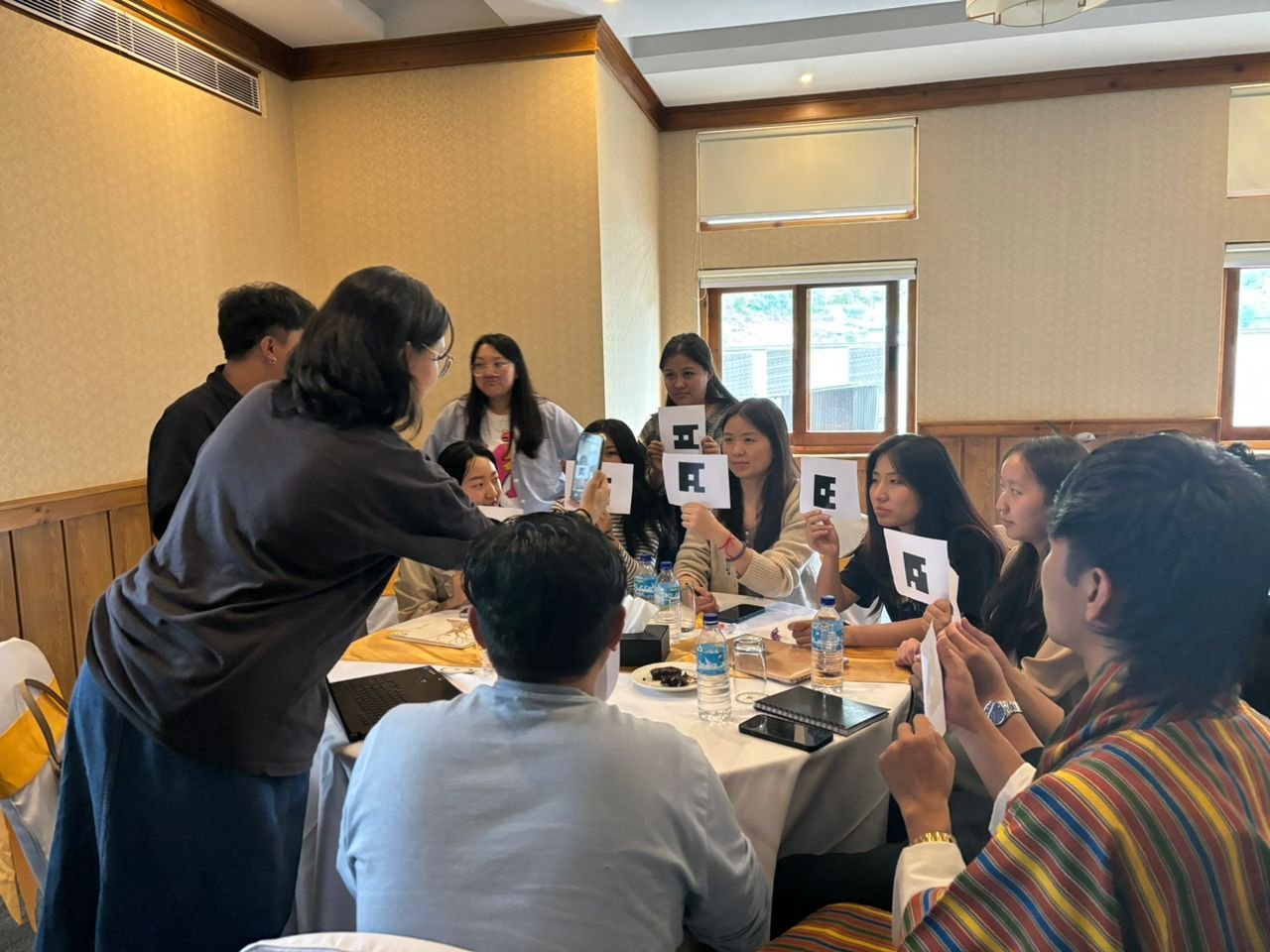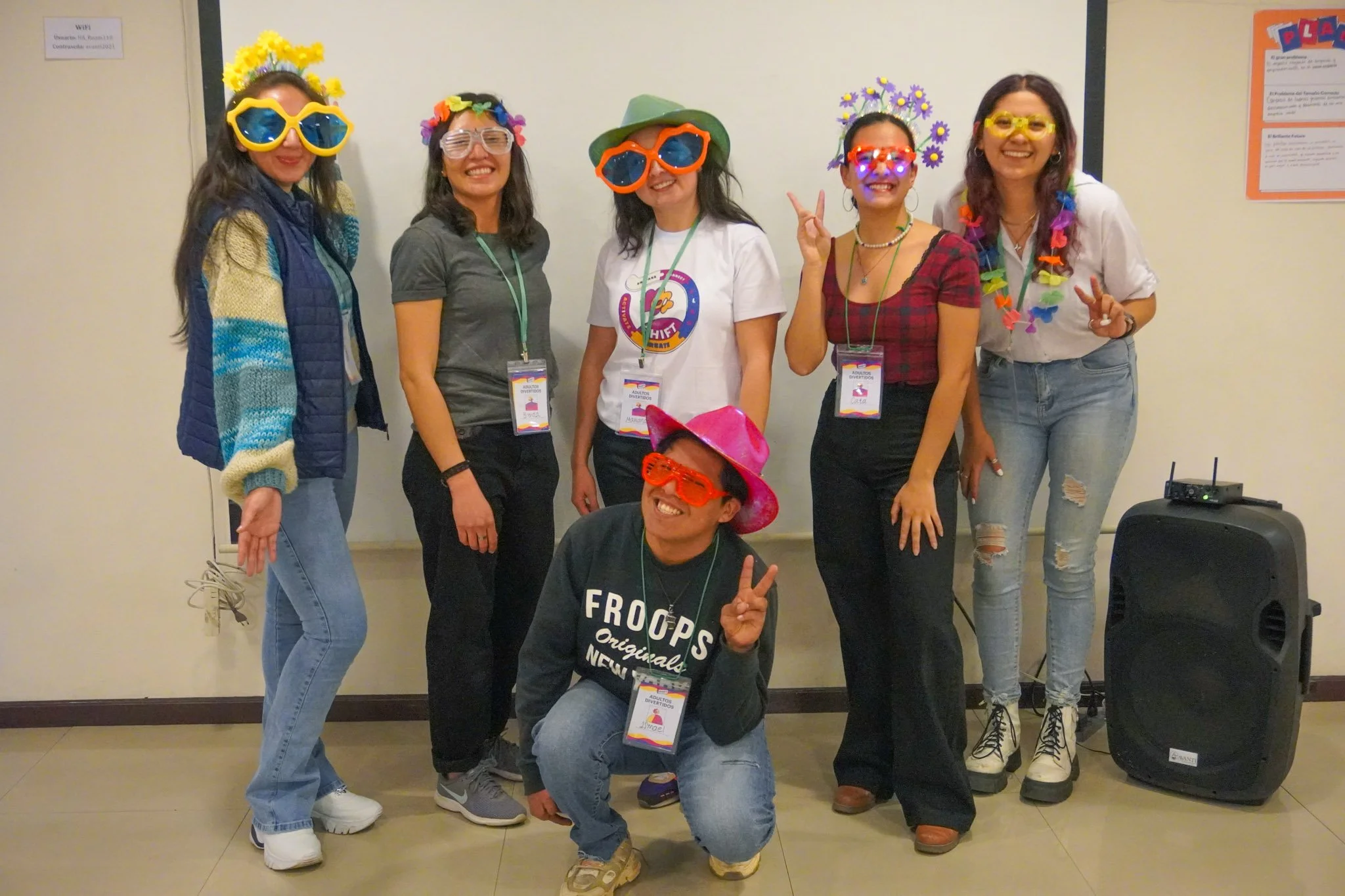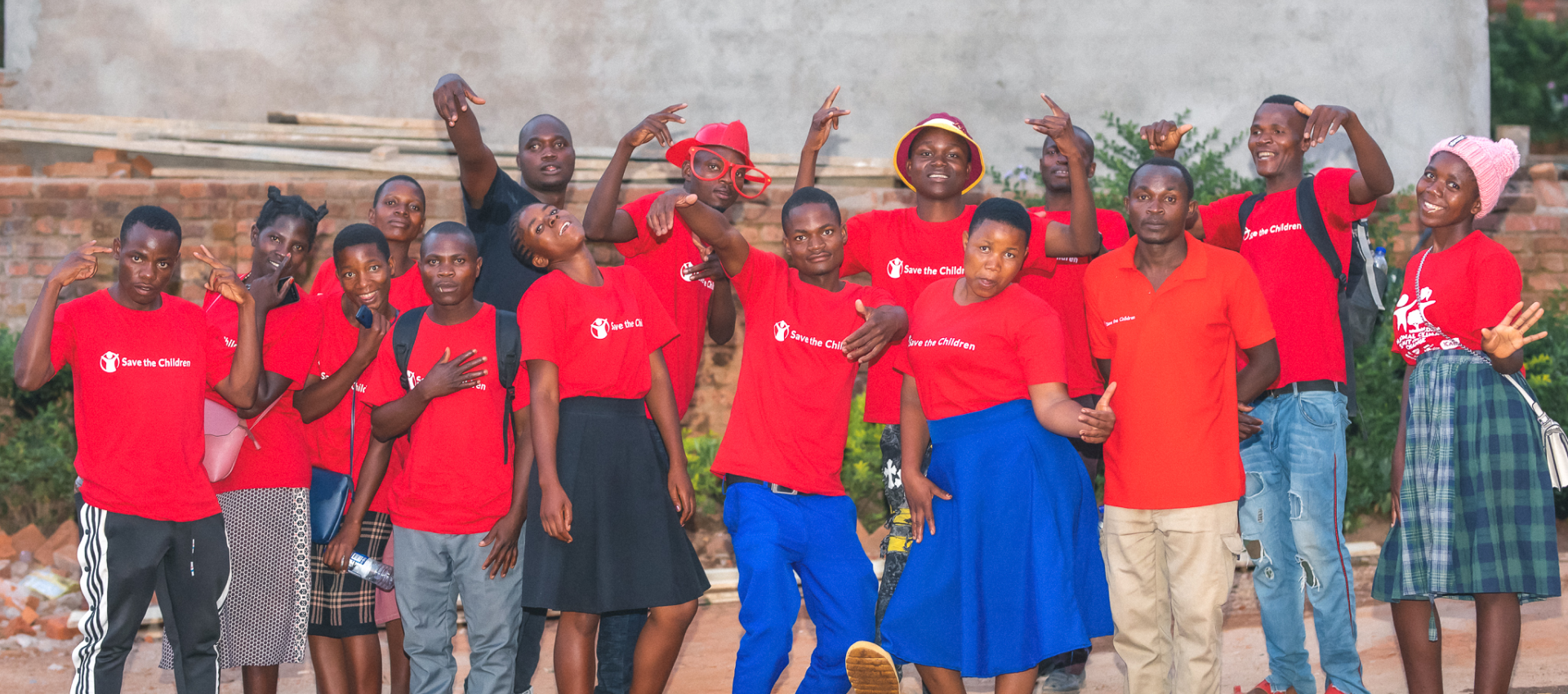
Beyond Empowerment: The Strength of Peer-to-Peer Networks
As of 2024, SHIFT has been used by over 90 child and youth-led groups in 22 countries - and this scale has enabled us to begin our work of growing the peer-to-peer exchange globally.
One of our dreams, as we scale SHIFT around the world, has been to nurture a robust ecosystem of young changemakers who are locally grounded, but globally connected. This space would then serve as a network or platform for a meaningful exchange of ideas, inspiration, best practices and challenges.
As of 2024, SHIFT has been used by over 90 child and youth-led groups in 22 countries - and this scale has enabled us to begin our work of growing the peer-to-peer exchange globally.
As child and youth-led groups undergo the SHIFT model, they develop highly contextual and deep expertise on their ‘right-sized problem’ (an issue small enough to tackle, but big enough to matter). This includes stakeholder mapping, collaborating with leading local creatives, and developing innovative advocacy tactics that resonate deeply with their target audiences when activated. With sustained support, such groups get more ambitious in their goals and scale their impact from local to regional and district levels.
Peer-to-Peer Learning in Action
When SHIFT was first piloted in Myanmar (2019), Air Quality Yangon (AQY) - a group of students concerned with air pollution, used a mascot called Dr Air Bear to heighten awareness about the issue. The pristine white bear gradually turned muddy from the pollution in the air as AQY activated their campaign. This captured the public’s attention, which in turn influenced the Department of Meteorology to start releasing air quality data daily to the public for the first time.
In 2024 inspired by AQY’s innovative tactic, Nepalese Youth for Climate Action (NYCA) connected with AQY over a facilitated session and then set out to launch their own ‘Saathi, the Air Bear’. Their goal? To equip children and youth with the knowledge and tools to access real-time air quality data in Katmandu, which has one of the highest pollution levels in South Asia. Saathi drew immediate attention from children and youth, and NYCA used this captive audience to activate their advocacy messages. At the end of their campaign, NYCA succeeded in installing 2 air quality monitors, reached 1,125 children and youth and even submitted a Youth Declaration Paper to their Ministry of Forest & Environment.
This is where peer-to-peer exchanges become game-changers. Through SHIFT, young changemakers connect, share experiences, and inspire one another, strengthening their movements and fueling their resolve.
Sustaining Youth Movements Through Shared Support
Child and youth-led groups drive incredible change despite balancing school, family, and personal growth while tackling complex social issues. They navigate systems and policies that often overlook them, struggling for resources and recognition in a space dominated by larger institutions. Yet, they persist—innovating, mobilising, and pushing for systemic change. Staying motivated, however, is a challenge especially when progress feels slow or obstacles seem overwhelming.
Initiatives like the Monthly SHIFT Africa Catch-up calls, hosted by Chrispine Botha (our Africa Lead) and Interactive Panel-style Learning sessions hosted by Gabby (our Asia Lead) create vital spaces for young leaders to troubleshoot challenges and celebrate wins together.
THESE EXCHANGES DON'T JUST TRANSFER KNOWLEDGE; THEY BUILD SOLIDARITY, RESILIENCE, AND A SHARED SENSE OF PURPOSE.
LOOKING FORWARD: UNLEASHING THE POTENTIAL OF THE EVOLUTION TRACKER
We launched our Evolution Tracker in 2024 as a gamified approach towards assessing the health of child and youth-led movements. However, it is more than just a tool—it’s a gateway for structured, peer-to-peer learning. As more groups use it, the data generated will unlock new opportunities for targeted collaboration. By grouping changemakers based on geography, language, or shared challenges, we can facilitate exchanges that maximize collective strengths.
For example, Touna, a youth-led group from Mali, has reached Level 3: Influential in the Network category. If a group from Senegal wants to strengthen its networking skills, we can connect them for a learning session—leveraging their shared French language and regional context to make the exchange more impactful.
By scaling this model, the Evolution Tracker won’t just measure progress—it will actively shape a thriving ecosystem where young changemakers learn from and uplift one another.
Shifters are younger than you think
One of the newsletters in 2024 from our colleagues at CUBIC about Belief Perseverance struck a resonant chord with us; we have repeatedly heard that “SHIFT is mostly for youths”.
One of the newsletters in 2024 from our colleagues at CUBIC about Belief Perseverance struck a resonant chord with us; we have repeatedly heard that “SHIFT is mostly for youths”. While it is a simple belief, it has potentially major implications - “the tendency to cling tightly to initial conclusions” about SHIFT directly affects how one imagines future possibilities, synergies, collaboration opportunities, potential integration and even its limitations.
However, research suggests that while belief perseverance can be quite stubborn to shed, a combination of critical thinking, diversified evidence and open-mindedness can help overcome it. That’s why we are starting off 2025 by cleansing away assumptions and going back to the very beginning of SHIFT in 2020 to systematically understand who Shifters are globally. Here’s what we found:
1 IN EVERY 5 SHIFTERS IS A CHILD (<18) IN AN EXCLUSIVELY CHILDREN-ONLY GROUP
Out of 63 shifter groups in 17 countries, 8 groups are composed entirely of children¹ totalling 377 Shifters; this makes children the second-largest Shifter demographic. However, if the age cut-off is adjusted to 19, adolescents² comprise 29% of all Shifters globally - the largest demographic in the SHIFT universe.
YOUTH MAKE UP ONLY 10% OF ALL SHIFTERS GLOBALLY
Despite prevailing beliefs that SHIFT is mostly for youths, in reality, youths³ make up only 10% - that is 1 in every 10 Shifters. Even though youth shifter groups outnumber children-only groups i.e. 19 youth groups (versus 8 child groups), the number of Shifters within children-only groups generally remains larger than the youth groups. This could perhaps be one reason for the prevailing belief that SHIFT is mostly for youths.
FEMALES MAKE UP THE MAJORITY OF SHIFTERS!
Within the SHIFT universe, females make up 54% of the Shifters followed by males at 43% and non-binary Shifters at 3%. Females make up the majority in all demographics except Young Adults4 (18-25) and Adults5 (>18) where males outnumber females.
While a majority female has the advantage of numbers and therefore, the opportunity to mainstream gender into Shifters’ campaigns and activities, it needs to be balanced with not perpetuating the broader the broader gender inequalities with females taking on unpaid, voluntary work disproportionately.
SHIFTERS GROUPS THAT FALL INTO MULTIPLE DEMOGRAPHIC CATEGORIES MAKE UP 15%
17 groups out of a total of 63 have members in an age range that cannot be neatly folded into defined demographics such as children (<18), adolescents (10-19), youth (15-25), young adult (18-25) or even adult (>18). See the example below.
This mixed group make up the third-largest group in our dataset comprising a total of 249 Shifters. In our experience, this reflects the on-ground reality where young people primarily mobilise around an issue that inspires their passion and collective action - not rigidly around an age criteria.
This diversity in their members' age also makes it more likely for movements to be genuinely led by young people, since older adolescents and youths often have the required capacity to lead independent groups. Supporting such a movement also simultaneously invests in a graduation model that younger children can step into as they become youths and young adults.
1 A child is any person under the age of 18 (UN CRC)
2 Adolescence is the phase of life between childhood and adulthood, from ages 10 to 19 (WHO)
3 The United Nations, for statistical purposes, defines ‘youth’, as those persons between the ages of 15 and 24 years
4 Young adulthood is a unique developmental period that occurs between the ages of 18 and 25 Years (Higley, Elena, "Defining Young Adulthood" (2019))
5 WHO defines “an adult is a person older than 19 years of age unless national law delimits an earlier age”. Since most countries sets the age of majority at 18, this article also adopts this definition
BEYOND DEMOGRAPHICS
While demographics give us a broad overall picture of the Shifter groups, they tell us nothing about their cascading impact on children in their communities. For instance, in 2023, a group of 8 Shifters aged 18-25 (young adults) in the Tsagibji district of Ethiopia led a grand march in their town. Under their campaign motto “All Children to School” they united the entire community and advocated prioritising education for all children.
This eventually led to 600 internally displaced children returning back to school. SHIFT in Ethiopia shows us that even in cases where Shifters are not necessarily children (<18), the realisation of children’s rights, i.e. access to education, remains at the heart of SHIFT.
Forget the paperwork — this is what really fuels us!
As we continue to scale up Shift and thereby expand our efforts to put young people at the forefront of change-making, we remain committed to not losing touch with the ground - that space where our incredible Shifters mobilise thousands of community members, impact policies on preventing teenage pregnancies, break gender stereotypes, build continental coalitions and even secure funding in the face of enormously complicated and child un-friendly systems.
As we continue to scale up Shift and thereby expand our efforts to put young people at the forefront of change-making, we remain committed to not losing touch with the ground - that space where our incredible Shifters mobilise thousands of community members, impact policies on preventing teenage pregnancies, break gender stereotypes, build continental coalitions and even secure funding in the face of enormously complicated and child un-friendly systems.
We spoke to Phuntsho Wangchuk, the co-founder of Gola-Gola (trans. 'Clothes-Clothes') over a virtual call to learn more about their social initiative, that simultaneously tackles over consumption, clothing waste, and regional inequality in Bhutan.
SERIOUS ABOUT WORKING IN GENUINE PARTNERSHIP WITH YOUNG PEOPLE BUT DON'T HAVE TIME TO READ THE ENTIRE INTERVIEW?
Here're the 5 most important takeaways:
Could you tell us about Gola-Gola Bhutan?
PHUNTSHO: Gola-Gola, Bhutan is a youth-led social service initiative founded in 2022 that focuses on:
Collecting clothes from those who have excess clothes.
Distributing clothes to underprivileged communities in Bhutan.
Raising environmental awareness about excessive clothing consumption.
It was started by four high school students with a small grant. While the grant was intended to help youth start businesses, we chose to focus on social service instead.
What was Gola-Gola Bhutan's early days like? How has it changed over time?
PHUNTSHO: So we began with only $83 but completed three projects, transporting 1,000 clothes across. However, after receiving funding for the Shift campaign, our budget increased to $6,500 which excited us because it allowed us to dream big and launch a comprehensive project.
What activities did Gola-Gola Bhutan undertake as part of Shift?
PHUNTSHO: We completed five activities:
Tree plantation program where we collaborated with the EFN Society Club under WWF to plant 108 trees.
Three weekly cloth donation drives where we amassed around 3,000 items of clothing, partnering with an online taxi service, DrukRide.
Cloth donation drives at three colleges: Royal Thimphu College, Gyalpozhing College of IT, and the University of Medical Sciences
Cloth distribution project in the eastern district of Lhuentse, where we repaired 2,800 clothes and distributed them over 6 days, benefiting approximately 230 people.
Upcycle fashion design competition, where we raised awareness about excessive clothing consumption and encouraged recycling and creativity by having high school and college students create new designs from secondhand clothes.
How did Gola-Gola Bhutan raise awareness about your weekly donation drives?
PHUNTSHO: We leveraged social media platforms like Facebook, Instagram, TikTok, and X to announce our door-to-door collection campaign. We also gained media attention through a national news feature and coverage by a reporter we met during one of our drives.
What are Gola-Gola Bhutan's future plans?
PHUNTSHO: We are now working on establishing 10 clothing donation drop boxes across Bhutan by December to make donating easier and more accessible.We would also like to scale up the project by acquiring a well-functioning warehouse, better equipment, and machines to improve and streamline the process of repairing and distributing clothes.
What we do is entirely based on collaborations - with the local government, businesses and local communities - who are very supportive of what we do. This gives us a way forward and motivates us to keep going.
What has been the most memorable experience for Gola-Gola Bhutan?
PHUNTSHO: The cloth distribution project in Lhuentse was particularly impactful. We were surprised by the high turnout of about 230 people, highlighting the need for our work in rural communities. We distributed 800 clothes on the first day, exhausting our supply and prompting us to call for additional donations from their volunteers in Thimphu. This experience was the most memorable for us and also helped us realise the importance of adaptability.
I must also add that the real passion actually lies in us distributing the clothes to the rural communities and not in doing project management which can test us and make our passion waver sometimes.
Tell us more about Gola-Gola Bhutan's core principles.
PHUNTSHO: One of our guiding principles is to return from distribution projects with either partially full or full boxes of clothes. This would mean that the needs of the community have been met and that our work is done in that location.
What impact did the Shift program have on Gola-Gola Bhutan?
PHUNTSHO: The great thing about Shift is that they actually understand that they are working with young people and are very patient with us. They provide flexibility in how we do things and as a youth, we need flexibility. Shift also provided significant financial support, enabling the expansion of our activities. Personally, I am thankful for the mentorship and guidance offered through Shift which helped our young team develop essential project management skills, including budget management, project reporting, and navigating complex procedures - skills which are essential but not really taught to us otherwise. I also believe these factors contributed to Gola-Gola’s success.
You can follow Gola-Gola on Facebook, Instagram, TikTok and X
Accelerating change through a digital Pan-African Shifters network
Imagine a space where a young poet from Uganda inspires a musician in Malawi, where a debate on SRHR in Zambia sparks a movement in Mozambique. This is the reality of 'Shifters Across Africa', our vibrant online community where we are learning, growing, and igniting change together.
Imagine a space where a young poet from Uganda inspires a musician in Malawi, where a debate on SRHR in Zambia sparks a movement in Mozambique. This is the reality of 'Shifters Across Africa', our vibrant online community where we are learning, growing, and igniting change together.
What started as an experiment to bring Shifters together on a simple call to facilitate peer-to-peer learning, has now grown into a 200+ member platform from over 8 countries within 4 months. Here’s what we are learning as we continue to nurture this space and enable Shifters to learn from each other
SHIFTERS DERIVE GREAT JOY IN CONNECTING WITH CHANGEMAKERS IN OTHER COUNTRIES TO SHARE THEIR CAMPAIGN HIGHLIGHTS, CHALLENGES AND ACHIEVEMENTS.
Shifters continue to provide regular updates, driven not by reporting requirements but rather through their own volition to share their excitement and milestone successes
Young people look towards each other to lend a listening ear and at times ideate solutions to challenges faced within their own respective contexts
One surprising observation was that once the space was created, shifters filled this space and made it vibrant through their excitement and collaborative intent
KEY TAKEAWAY
There is a need to capitalise on and nurture more peer-to-peer learning spaces. The role of the fun adult would be to set up the basic framework and ensure safeguarding while enabling young people to shape this space through their inputs
SHIFTERS TAKE GREAT PRIDE IN LEADING THEIR CAMPAIGNS. THIS MEANS SELECTING THEIR OWN TOPICS, DESIGNING STRATEGIES AND ENGAGING WITH STAKEHOLDERS
Shifters from Malawi are leading efforts to address illegal mining by engaging community leaders and government officials. They co-create solutions, demonstrating a shift from top-down decision-making to a more collaborative approach
Ugandan Shifters are designing and implementing campaigns to reduce teenage pregnancies and promote environmental sustainability, highlighting their agency in addressing issues affecting their communities
Shifters in Zambia are tackling challenges related to SRHR access, demonstrating their role in driving change within their communities
KEY TAKEAWAY
Generating more opportunities for young people to take the lead equates to a greater sense of pride and ultimately, ownership
SHIFTERS USE A VARIETY OF COMMUNICATION MEDIUMS TO CONVEY THEIR MESSAGES, FRUSTRATIONS, HOPES AND DREAMS. THE LANGUAGE, COLOUR AND MOOD WHICH DEFINE THE CREATIVE ART MEDIUM LENDS ITSELF WELL TO YOUNG PEOPLE.
Shifters from Ethiopia attribute their success in mobilising large crowds to their use of art-based activation. The inherent appeal and accessibility of artistic expressions attract community members and create engaging platforms for disseminating messages.
Shifters utilize various creative mediums (such as poems, debates and music) to evoke emotions, spark conversations, encourage critical thinking, shed light on pressing issues and inspire action
Through their partnerships with creative professionals in developing their campaigns (a core component of Shift), Shifters make their campaigns more engaging, relatable, impactful and their own.
KEY TAKEAWAY
Leverage creative mediums like art, poetry, and music to allow Shifters to convey powerful messages and amplify impact.
TECHNOLOGY CAN BE HARNESSED TO BRIDGE LINGUISTIC BARRIERS AND FOSTER INCLUSIVITY IN THE AFRICAN CONTINENT WHERE YOUNG PEOPLE SPEAK ENGLISH, PORTUGUESE, FRENCH AND ARABIC AMONG OTHER LANGUAGES.
Recognising the wide disparity in access to technology and connectivity across different geographies, the Shift team found a way to enable translation within the app and made a step-by-step video tutorial on how this can be enabled.
With rapid developments in live, real-time translation features, we look forward to capitalising on this to employ emerging and AI technology in bridging gaps between young people.
KEY TAKEAWAY
Take advantage of an emerging pain point and convert it immediately to a learning opportunity so that support to young people becomes responsive, adaptive and applicable.
The growth of "Shifters Across Africa" underscores the potential of youth-led, peer-driven spaces to accelerate change. By fostering cross-border connections, empowering local leadership, and harnessing technology and creative expression, we can amplify young voices across Africa, building resilient movements equipped to address pressing social and environmental challenges.
Want to join Shifters Across Africa?
Note: You must be a Shift-implementing country
Email chirspine.botha@savethechildren.org
Assessment Made Easy, Fun & Meaningful!
What factors are critical when we look at successful movements led by youth people? This was one of the core questions that motivated us to revisit our Impact framework earlier this year. Subsequently, this also became one of the driving questions for a research project on Shift to study its long-term potential and impact.
What factors are critical when we look at successful movements led by youth people?
This was one of the core questions that motivated us to revisit our Impact framework earlier this year. Subsequently, this also became one of the driving questions for a research project on Shift to study its long-term potential and impact. The findings revealed both enabling factors such as motivation, group diversity, partnerships, networks, financial base, etc., and challenges around rigid structures, power inequalities and inadequate institutional capacities to incorporate young voices. Combined with practical insights gathered over the past 5 years operating in over 20 countries, we now have a revised impact framework and tool: meet our Evolution Tracker.
We all agree on the importance and need for assessments. However, not all of us agree on how assessment should be done. Most current approaches to evaluation employ an extractive logic where young people are seen as subjects to whom assessments are administered. For young people taking the assessment, it often resembles the tests and exams, along with the accompanying boredom and anxiety.
Instead, assessments should be yet another empowering tool in a young changemaker's growing resource arsenal, providing them with useful, relevant and meaningful data to make good decisions.
The Evolution Tracker moves away from this approach and instead merges innovation from the EdTech and gamification space to create a fun and interactive experience. By playing the Evolution Tracker, young activists respond to prompts that spark reflection about their own journey, whilst subtly educating them on indispensable factors that matter deeply for nurturing successful movements.
This approach provides Shifters with insights and data they need to effectively improve their strategy, group governance and sustainability in a language and medium most conducive to them; it also better allows them to track their progress as they move towards their long term goals.
For the Fun Adults facilitating this game, the ease of implementation has been drastically lightened since the otherwise arduous task of data collection and analysis is now automated through the game app. With this also comes greater transparency and instant access to the data gathered between all partners, equally.
Since young people are at the center of everything that Shift does, the assessment process loops around and ends with them. After analysing the data, we get back to the young people with their Evolution Scorecard, a graphic-heavy, youth and child-friendly card guiding young people about their progress on their journey to become influential change agents.
Over several years, this makes it easy to track longer-term change (even without Shift in the picture) since young people would simply have to play the game once every year, without additional resources or intensive training. For the fun adult, having this periodic data set also enables them to have their finger on the pulse of youth and child-led movements within their localities; it would also help better inform their programmatic priorities, particularly on capacity building and progressive scaling up.
Evolution Tracker in Action
Piloted on
3rd August 2024
Total time taken
~30 minutes
Shift groups:
3
Educate their fellow children and youth about sexual and reproductive health & rights
Legal advocacy on procedural rights and duties of children who come in contact/conflict with the law
The 3 Shift groups were gathering for a multi-media workshop. I requested the fun adult for a 30-minute slot to try the tool, which she kindly agreed to.
After a brief introduction and instruction, 17 statements were projected onto the screen sequentially that prompted responses across the 9 categories and 17 indicators of successful child and youth-led movements. The Shifters turned their papers to indicate their response; once everyone was ready, their responses were scanned using an app. This automatically logged all responses, as the camera scanned from one side of the room to the other capturing all the paper responses.
Following this exercise, their responses were then exported into a database that calculates their average scores per group and generates a categorisation of where they are on their evolutionary journey to become Influential change agents. Finally, we put this insight into a child-friendly Evolution Scorecard which is given back to the Shifters. See the attached Scorecard for a sample.
The Power of 'Consenso': Shifters Rewrite the Rules!
Okay, you might wonder what the big deal is about a video with young people simply saying “Consenso” (Trans. Consensus); but to appreciate this, we need to go back a few weeks.
Having supported a number of groups with different campaigns over the past two years (2022 and 2023), Fun Adults in Bolivia learned that while this approach had its upsides, it also led to conflicting messages and overstretched support towards the Shifters. That is why in 2024, Fun Adults decided to try a different approach: have 2 new youth groups work together on a single campaign.
Okay, you might wonder what the big deal is about a video with young people simply saying “Consenso” (Trans. Consensus); but to appreciate this, we need to go back a few weeks.
Having supported a number of groups with different campaigns over the past two years (2022 and 2023), Fun Adults in Bolivia learned that while this approach had its upsides, it also led to conflicting messages and overstretched support towards the Shifters. That is why in 2024, Fun Adults decided to try a different approach: have 2 new youth groups work together on a single campaign.
One of the two groups was the Global Youth Biodiversity Network (GYBN) Bolivia, an established group working to conserve biodiversity, cultural diversity and social equity. The other group (formed relatively recently) was the JCI Tunari and Partners Campus SS, an organisation of young leaders who create opportunities for continuous development via training and project implementation.
Given the (presumed) differences between the two groups, Fun Adults in Bolivia did what any good facilitator would do: anticipate the potential conflicts between the two groups and already put in place, a voting system to help Shifters in decision-making as they co-create their campaign plan. However, at the actual workshop, Shifters surprised the Fun Adults.
“NO, WE DON’T WANT TO VOTE BECAUSE THAT SHUTS OFF OTHER VIEWS AND OPINIONS.
INSTEAD, WE WILL COME TO A CONSENSUS AFTER DISCUSSING AND THEN LET YOU KNOW WHAT WE FINALLY AGREE ON”
At that moment, Fun Adults realised it was time for them to sit back and let the Shifters run the show. These small but truly amazing moments demonstrate how young people practice the values that we hold very dear at Shift: radical participation, genuine inclusion, co-creation, partnership, solidarity and collaboration.
As Fun Adults, there are two lessons to learn from Bolivia:
Be flexible in modifying the approach even if it deviates from what was initially planned
Prioritise and intentionally create spaces for young people to drive the process at every possible stage of your Shift journey
How Southwest Sumba ramped up young people's participation
When we say meaningful participation in Shift, we mean that excluded and marginalised groups of young people get the opportunity to tell us what issues matter most to them. It also means that they then, get the guidance and resources required to design a campaign around their issue and eventually go out into the world to effect positive change.
When we say meaningful participation in Shift, we mean that excluded and marginalised groups of young people get the opportunity to tell us what issues matter most to them. It also means that they then, get the guidance and resources required to design a campaign around their issue and eventually go out into the world to effect positive change.
Of course, none of this is possible if young people don’t even know that such a platform exists in the first place.
To Shift Power, we must begin by Shifting Participation. Fun Adults in Southwest Sumba know this fact very well. Gearing up for their Shift journey, they used an innovative and strategic approach to ensure large-scale sensitisation of Shift among young people in Tambolaka: a Roadshow!
Last year, roadshows were used successfully as a medium of campaigning by Barishal Shifters in Bangladesh to Break Barriers to Girls’ Higher Education. However, Southwest Sumba reimagines this and uses it at the beginning: to CONNECT with those would-be campaigners, encourage them to get involved, and grab the Shift opportunity with both hands.
BY THE END OF THEIR SHIFT SENSITISATION ROADSHOW, THEY REACHED 10 SCHOOLS, 1,159 STUDENTS AND TEACHERS.
"I am really interested in and appreciative of the opportunity to assist in preventing child, early, and forced marriages, a practice that is unfortunately still considered acceptable in the region.”
(Female student, 16 years old, SMAS St. Thomas Aquinas)
Not only were they able to generate excitement about Shift in their region, but they also used this opportunity to educate young people and adults about an urgent issue that is seeing rising cases: Child, Early and Forced Marriages (CEFM).
“The activities conducted are positive and inspiring, encouraging children to actively protect themselves from violence. I support this organization and the type of positive activities it carries out.”
(Female teacher, 28 years old, SMAK St. Joseph Freinademetz)
Following their sensitisation roadshow, the proof is in the pudding: 17 groups of young people have put in their applications for the upcoming Shift project! An impressive number for anyone implementing Shift. Out of this, only 2 groups will be selected to undergo Shift which is “a pleasant problem for us to have on our hands” as Andre (Fun Adult) puts it.
Southwest Sumba highlights the importance of adult-led, innovative outreach in creating spaces where young people feel seen, heard, and motivated to take action. This is how real change begins: with youth at the forefront, confident and supported in their journey to create a better future.
AGAINST ALL ODDS: How Ntcheu Shifters secured funding and continue to change lives
If you told me that an informal group of young people from a rural district of Malawi, with mostly secondary school qualifications, would go on to win funding within two years of campaigning, I’d say, “That’s not possible”. This can no longer be said ever since Ntcheu Shifters came onto the scene.
If you told me that an informal group of young people from a rural district of Malawi, with mostly secondary school qualifications, would go on to win funding within two years of campaigning, I’d say, “That’s not possible”. This can no longer be said ever since Ntcheu Shifters came onto the scene.
Ntcheu Shifters is a 15-member group (below 27 years) who were part of the Mgwirizano Youth Group. Mgwirizano first emerged in 2011 from Machira village, focusing on youth and child-led advocacy within their community. When Shift engaged with this already-existing group in 2022, they were clear in their vision: “End School Drop out” - a vision that responds to their lived realities and priorities about what issue is most important to them. Shift respects this important starting point; we let young people decide what matters to them and this becomes the soil in which their passions flourish.
During their first half year of campaigning to get children and youth back in school, Ntcheu shifters surprised local stakeholders and community (Head of Education, Ntcheu District).
“WHAT SHIFT HAS DONE WITHIN HALF A YEAR OF CAMPAIGNING IS SOMETHING WE HAVE NEVER BEEN ABLE TO DO AS A DEPARTMENT FOR YEARS.”
(Head of Education, Ntcheu District)
3,894 community members and stakeholders reached
117 out of 160 child dropouts have returned to school
9 child marriages dissolved
Despite being informal and unregistered, Ntcheu Shifters’ demonstrated effectiveness, passion and recognition from their community made them a formidable force. Hence, when Save the Children Italy were considering partners to help deliver their localisation goals, Ntcheu Shifters found themselves with an opportunity to continue their work beyond Shift’s project cycle. Leveraging their hard-won partnerships, including local NGOs, they drew on the existing intellectual and human resources to put together their proposal to get closer to their vision of ending school dropouts. Having won the proposal, Ntcheu Shifters will not only become registered and receive support to grow their capacities, but also continue their campaign into the third year to ensure every boy and girl in Ntcheu pursue their education further.
The past two years of campaigning on reducing school dropouts have impacted both the community as well as the participants themselves. While they were initially looking outward in their campaign, the process has inspired Shifters to look inward; many of them including the Chairperson and the Secretary of the group have now decided to pursue higher education.
Freza Mbalu (Chairman) is now Form 3 (lower secondary level) at Madzanje Community Day Secondary School
Esnart Thamangani (Secretary) is now Year 0 studying Community Development at Zomba Vocational Training college
Will Chitsulo & Blessings Charlie now writing Form 4 examination in July, 2024
Conversation with a born Fun Adult
When we say someone is a 'Fun Adult', we mean that they are simultaneously a facilitator, mentor, partner, cheerleader, young-at-heart, believer and a cool uncle or aunt that young people look up to. We work very hard to create Fun Adults at Shift, but sometimes we find that some adults just get it. They are just born with it!
When we say someone is a 'Fun Adult', we mean that they are simultaneously a facilitator, mentor, partner, cheerleader, young-at-heart, believer and a cool uncle or aunt that young people look up to. We work very hard to create Fun Adults at Shift, but sometimes we find that some adults just get it. They are just born with it!
Last month we got an email from one of our champion Fun Adults in Bhutan, Deepika, who had just heard from Gajendra, an educator. Gajendra was present at one of the Shift workshops and was,
“really inspired and wanted to adopt and adapt the Shift model for social and environmental activism or learning”.
I couldn’t pass up the opportunity to learn more from this born Fun Adult. We spoke to each other over a video call. The transcript has been edited for clarity and brevity.
Could you tell me a bit about yourself?
I'm Gajendra Rai, and I am currently a teacher at Damphu Central School.
I teach chemistry and ICT.
Could you talk about how you saw Shift and what you thought of it? Basically what inspired you to connect with Deepika and initiate that conversation??
I feel Shift is really inspiring, especially because you don't need lots of things to do it. Even within a short duration of time, the youths can come up with very creative initiatives and solutions on whatever issues they feel is appropriate.
And another thing I also feel is that this is one of the powerful programs where the voice of the youth has been captured and they are given the freedom to share their thoughts, discussions, and ideas for collaboration.
As a much closer observer and a mentor to most of these students, what were your observations and reflections on how young people experience Shift?
You know at the end of the program, I could feel that the individual participants in the group felt that their voices had been heard; even those that were very silent by nature. I asked some of them “So how did you feel today?” and they shared that “Today, I feel I could thoroughly express myself. My thoughts have been counted”.
I feel that I also have to give the ripple effect to Shift but before I could even share my thoughts the participants were coming up to me and saying “Sir, why don’t we combine Shift with a project that we already have that has been funded to make it even bigger?” Shift program has ignited inspiration within them. They don't want to stop. They want to involve as many of the people as they can.
What challenges do the young people and students that you teach face?
As an educator, I also had that same question for myself. How can we improve the mentality of always blaming the systems or blaming themselves? Basically what I feel is that they are lacking the inspiration within and they reach a point where they stop believing in themselves. They are not taking up the opportunities. They have the talent but lack the confidence in themselves to come forward. They need the guidance. This changed when I experienced Shift last time because they were trying to move towards positive change and also wanted to transfer that type of quality to their friends. Youth-to-youth bonds are much stronger than the elder-to-youth ones.
Is there anything else that you would like to add that I haven't had the chance to ask you?
I'm also planning to include Shift as a Professional Development course for my teacher colleagues and for our school leaders, captains, and counsellors because I feel that it would be useful in resolving any sort of problems if they have the skills nurtured by Shift.
UNLEARNING
Yes, shifting power requires us to move the dial on power towards young people and track this movement; but before this can happen, it calls us to undergo a mindset shift first. It calls us to unlearn.
A Psychological Prerequisite to Shifting Power
Yes, shifting power requires us to move the dial on power towards young people and track this movement; but before this can happen, it calls us to undergo a mindset shift first. It calls us to unlearn.
Our colleagues at CUBIC tell us about confirmation bias - a notorious feature of our psychology that actively seeks evidence confirming our pre-existing beliefs and ignores information that challenges us. Applied to youth and child-led campaigning, people who uphold beliefs about children as human becomings (rather than human beings), often unconsciously seek out all the reasons why youth and child-led campaigners can’t be approached as equal partners in social and environmental change.
HOWEVER, YOUNG CHANGEMAKERS CONTINUE TO PROVE US WRONG, TIME AND TIME AGAIN.
UNLEARN: “It is always more efficient to solve social and environmental issues using already entrenched powerful institutions.”
There are already existing institutions working in adolescent health space in Bhutan. However, when Y-PEER Bhutan launched their campaign to heighten young people’s awareness of their Sexual and Reproductive Health and Rights, they were able to do it much more effectively.
The reason: they took an EduTainment approach that spoke to young people in a language they could easily understand and relate to. From the multitude of testimonials that were collected from young participants by Y-PEER Bhutan, most talk about how it was not the usual classroom teaching but rather something exciting and different.
By complementing the energy and mobilising strength of grassroots, with partnerships and longer-term lifespans of formal institutions, we can most effectively move towards solving persisting social and environmental problems.
UNLEARN: “Children and youth groups do not have the requisite capacity to manage funds, at least not to the level that financial systems require.”
Scrutiny around the child-friendliness and risk appetite of current financial systems to work with young people are gradually coming to the fore. However, despite immense existing challenges, youth and child groups supported by genuine adult partners find innovative workarounds to live up to their commitments.
For instance, Ethiopia’s two youth-led groups - Lenege and Bekere Lewt - were faced with the challenge of transferring funds to carry out their campaign in 2023. Against this, Ethiopia’s Fun Adults forged a partnership with Kishene, a youth-led theatre company that then helped channel the funds to the two campaigning groups. SHIFT Ethiopia was able to find a creative workaround for the existing barriers.
UNLEARN: “Youth and child-led groups have weak and often limited human resource capacity, which means that they can only affect small-scale and local impact”
Given the highly mobile nature of young people's lifestyles often having to move around for education, employment (their own or their parents) or in pursuit of other opportunities, it does play an important factor in their group dynamics. However, youth and child-led groups often have extensive networks that can amplify their initiatives beyond their localities.
Lilongwe Shifters from Malawi are a part of the National Youth Network for Climate Change (NYNCC), which they used as a platform to provide a youth and child-centred perspective to the COP28 national deliberations and dialogue in 2023.
WHAT WE NEED TO RELEARN
Such evidence encourages us to become more cognisant of our confirmation biases around why young people can’t become true partners in change-making. Instead, it calls us all to unlearn - learn - relearn so that we can prime ourselves to shift power meaningfully.
Shifting Power begins here
We are beginning to generate insights into the critical factors that enable impactful campaigns. It would be a shame if we kept this to ourselves; actually, we probably couldn’t, even if we tried.
Kuzuzangpola! I’m Rigsar from Bhutan (which you probably heard of as the first carbon-negative country or as the country with a Gross National Happiness (GNH) index). I’ve had the privilege of working with some of you over the past 2 years; but even if we haven’t met, I’ve been cheering your campaigns from behind the scene.
HOW EXCITING IT HAS BEEN TO BE SURROUNDED BY SUCH OPTIMISM, ENERGY AND CREATIVITY OF YOUNG PEOPLE!
SO WHY ARE WE TALKING ABOUT SHIFTING POWER NOW?
Actually, this conversation has been ongoing for some years and continues to gain importance (as reflected in SCI’s 2022-2024 Strategy) as we move forward. From the SHIFT standpoint, we believe that we have reached a critical threshold:
As we continue to work with and learn from accelerating child and youth-led groups in over 20 countries globally, we are beginning to generate insights into the critical factors that enable impactful campaigns. It would be a shame if we kept this to ourselves; actually, we probably couldn’t, even if we tried.
WHAT’S UP WITH THE LOGO? WHY PIZZA? WHY SEVEN SLICES?
Firstly, pizza because who doesn’t like pizza? There are endless ways to customise pizza centred around a few key ingredients - much like SHIFT - and make it so anyone can enjoy it. We have seen this in action with Shifters and our awesome Fun Adults in 3 continents so far.
Secondly, seven, because we believe that for us to meaningfully shift power to young campaigners, there are seven key dimensions (dare I say slices?). And it’s not us that’s saying this. It’s our organisation. We are only doing what we do best at SHIFT: make it child-friendly and show it in action.
WHAT’S IN IT FOR ME?
The content for Shifting Power has been prompted based on findings from a survey circulated to Shifters and Fun Adults in 2023 where we asked what the main barriers to empowering young people were.
Here are some of the most cited responses from a total of 152:
“PEOPLE AND ORGANISATIONS WITH POWER STILL DON’T FULLY TRUST US.”
…so, how can organisations shift society, culture and child-unfriendly bureaucratic practices, so that true partnerships can be fostered?
“AS A FUN ADULT, I AM NOT ENTIRELY SURE HOW AND WHAT ASPECT OF POWER TO TRANSFER TO THE SHIFTERS.”
“MOST YOUNG PEOPLE ARE EITHER UNWILLING TO TAKE UP LEADERSHIP ROLES; THEY ALSO LACK THE SELF-ESTEEM AND CONFIDENCE TO COME FORWARD.”
How can we build the capacity of adults working with young people so that they can guide and empower young people?
“I AM NOT SURE HOW TO BALANCE THE OPINION OF ALL MY PEERS SO THAT EVERYONE FEELS INCLUDED.”
How can we be intentional in the space we create for young people so that they are able to, and value diversity?
Shifting Power will also disseminate insights and lessons into cutting-edge approaches on other dimensions of funding, partnerships, visibility and policy influence. In short, we will provide you with the knowledge, practical skills and lessons to help you in your goal of shifting power to young people - which will ultimately generate locally owned, sustainable and meaningful impact.
OKAY, I LIKE WHERE THIS IS GOING.
How can I make sure I am at the front of the line in getting this content?
We have made it super easy for you 😄
Join our newsletter!
Follow us!







